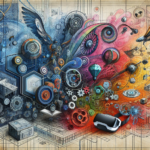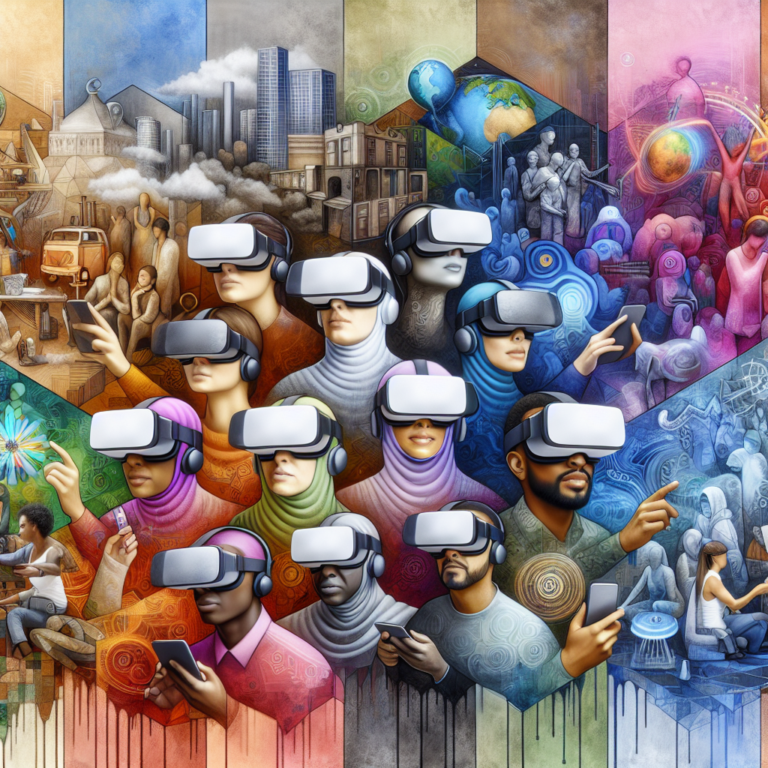Stepping Into Shoes: The Transformative Power of Virtual Reality Perspectives 🌍
Imagine a World Where You Can Walk a Mile in Someone Else’s Shoes
Virtual Reality Empathy : Virtual Reality (VR) has revolutionized how we interact with the digital realm, pushing boundaries that were once confined to our imaginations. But what if this cutting-edge technology could do more than just immerse us in fantastical worlds? What if virtual reality allowed us to truly experience life from different perspectives? This concept holds the key to unlocking deeper empathy, understanding, and connection. In this blog post, we will explore the potential of VR as a tool for perspective-taking, its implications for society, and how it can help foster more compassionate interactions among individuals.
Virtual Reality Empathy : The Science of Perspective-Taking
Before delving into the vast potential of VR, it’s essential to understand the psychology behind perspective-taking. This cognitive process involves placing oneself in another person’s circumstances, feeling their emotions, and understanding their thought processes. Research has shown that perspective-taking can lead to greater empathy and improved interpersonal relationships.
Some of the known benefits include:
- Enhanced Empathy: By stepping into someone else’s shoes, we can better relate to their feelings, improving our ability to empathize.
- Reduced Prejudice: Gaining insight into the challenges faced by others can break down stereotypes and foster a more inclusive mindset.
- Improved Conflict Resolution: Seeing a situation from another perspective often leads to more effective communication and resolution strategies.
How Virtual Reality Can Facilitate Perspective-Taking
Virtual Reality Empathy : Imagine donning a VR headset and finding yourself in a bustling urban environment, experiencing the life of a street vendor. Each day is a struggle, filled with challenges and triumphs that reshape your understanding of socioeconomic disparities. This is just one example of how virtual reality can facilitate perspective-taking by immersing users in authentic experiences.
1. Immersive Storytelling
Unlike traditional methods of storytelling, VR allows users to become part of the narrative. Here’s how immersive storytelling can work wonders in promoting understanding:
- First-Person Experiences: Users can experience life through the eyes of others—whether that’s a refugee escaping conflict or a person living with a disability.
- Realistic Scenarios: VR can simulate real-world challenges, allowing users to understand the daily struggles faced by individuals from different backgrounds.
- Interactive Choices: Users can make decisions that shape the narrative, leading to a more personalized and impactful experience.
2. Cultural Exchange
Virtual reality offers a unique opportunity for cultural exchange. Users can explore diverse environments and traditions without leaving their homes. Key aspects include:
- Global Connections: VR can bridge geographical gaps, allowing users to engage with people from various cultures.
- Live Interactions: Virtual events and workshops can foster dialogue and collaboration across borders.
- Celebrating Diversity: Users can partake in cultural rites, festivals, and routines that promote a deeper appreciation for other cultures.
The Impact on Society
The implications of experiencing life from different perspectives via virtual reality extend far beyond individual growth. For society, the potential benefits include:
1. Educational Advancements
Incorporating VR into educational settings can revolutionize learning. Students can:
- Engage with History: Step into significant historical events and gain firsthand insight into the past.
- Understand Complex Issues: Learn about social justice, environmental challenges, and more through immersive experiences.
- Enhance Critical Thinking: Virtual scenarios can challenge students to make decisions and evaluate outcomes based on different perspectives.
2. Mental Health Benefits
VR shows great promise in the field of mental health, allowing users to confront their fears and cultivate empathy. Potential applications include:
- Exposure Therapy: Gradually facing fears in a virtual environment can help individuals manage anxiety disorders.
- Empathy Training: VR experiences can help healthcare professionals understand the patient experience, enhancing their compassion.
- Support for Marginalized Groups: Empathy-building exercises can foster understanding among individuals from different walks of life.
3. Enhancing Workplace Communication
In an increasingly global workplace, the ability to understand colleagues from diverse backgrounds is invaluable. VR training can help teams develop emotional intelligence and promote collaboration:
- Team-Building Exercises: VR can host immersive team-building activities that encourage collaborative problem-solving.
- Conflict Management: Scenarios can provide insight into others’ motivations and behaviors, leading to better communication.
- Diversity and Inclusion Workshops: VR can be used to simulate the experiences of marginalized groups, fostering a more inclusive work environment.
The Future of VR Perspective-Taking
As virtual reality technology continues to evolve, the possibilities for perspective-taking are endless. Imagine a future where individuals regularly engage in VR experiences that challenge their viewpoints and inspire change. We may find ourselves in a world where compassion and understanding reign supreme, leading to healthier relationships, reduced conflict, and a more harmonious society.
The notion of experiencing life through different perspectives is not just a distant dream—it’s an emerging reality, one that holds the potential to transform how we connect with one another on a fundamental level. With powerful storytelling, cultural exchanges, educational advancements, and mental health initiatives, virtual reality can be a pioneering platform for building a more empathetic and understanding world.
So, are you ready to embrace this adventure and step into someone else’s shoes? 🌟




0 Comments